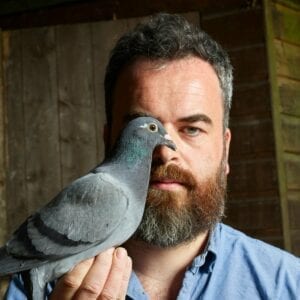
by Pigeon Patrol | Nov 16, 2021 | Bird Netting, Bird Spikes, Columbidae, Doves, history of pigeons
Not a Carrier Pigeon, Not a Messenger Pigeon, Not a Rock Pigeon
The passenger pigeon and the rock dove (Columba livia, aka rock pigeon, carrier pigeon, etc) are often confused in the public’s mind but they are not closely related. The dock dove is a Eurasian species that has been semi-domesticated for centuries and has been introduced into North America. They like to nest on ledges, which is one reason they have proliferated in cities around the world in a feral state.
Passenger Pigeons Were Unlike Any Other Bird in the World
in at Least Three Important Ways
The Passenger Pigeon was a bird solely of North America, with the vast majority inhabiting a region from the Gulf States to Hudson’s Bay, and from the Atlantic Ocean to the upper Missouri River. Three things made them unique in all the world:
1) they were the most abundant bird of the continent, if not the world: no one knows for sure how many there were but the most careful figure offered ranges from a low of three billion to a high of five billion individuals;
2) they aggregated in numbers that darkened the sky for as much as three days: individual flights might have exceeded two billion birds; and
3) in literally decades, human actions reduced this incredible bounty to zero, when on September 1, 1914, the last of the species died. Given that it is extinct, very little was known about its relationships to other birds until recently.

Where Passenger Pigeons Belong in the Tree of Life
Scientists divide the vast array of life forms into categories based on the similarities and relationships between organisms. From broadest to narrowest, these categories are Kingdom, Phylum, Class, Order, Family, Genus, species. All the birds of the world are in the Phylum Chordata, Kindom Animalia, Class Aves and then are divided into 26 orders. (based on the taxonomy of James Clements). These orders include the Falconiformes (hawks), Anseriformes (ducks and geese mostly), Strigiformes (owls), and Passeriformes (the largest order of all which includes the perching birds like warblers, swallows, flycatchers, finches, thrushes, and sparrows).
All pigeons are members of the order Columbiformes which have a number of characteristics that together set them apart from other birds. These include a bilobed crop that produces a sort of “milk” that is fed to the chicks (“crop” is a pocket like space near the throat); monogamous mating behavior; the ability to drink by sucking or pumping; and thick feathers set close to the skin. On a general level, pigeons possess stocky bodies with small heads, bills, and feet. (Passenger pigeons were among the sleekest of pigeons). There are 42 genera and 308 recognized species of Columbiformes.
Pigeons of the World: From 8 Pounds to 22 Grams
There is no difference between pigeons and doves: the terms are interchangeable. Pigeons are found throughout the world. Some pigeon species eat mostly fruit, whereas others forage on seeds. The fruit-eating Columbiformes tend to be much more vividly colored than the seed eating ones. The largest species is the Victoria crowned pigeon (Goura victoria) of New Guinea which approaches the size of a turkey and can weigh in excess of 8 pounds. The smallest species are members of the ground dove genus (Columbina): they can be as small as house sparrows and weigh not more than 22 grams.
Until recently, the relationship of Passenger Pigeon with respect to other pigeon species has been simply speculation based on gross plumage characteristics. However, recent genetic data published in 2010 by Johnson and colleagues (Molecular Phylogenetics and Evolution 57:455) show that, despite the gross similarity in appearance to mourning doves and its relatives (the genus Zenaida), the Passenger Pigeon is not closely related to this group of pigeons at all. In fact, its closest relatives are a group of large-bodied pigeons from the New World in the genus Patagioenas, which includes the western Band-tailed Pigeon among others. Even so, scientists believe that Passenger Pigeon is still different enough from other extant pigeons to remain in its unique genus, Ectopistes. Based on an analysis of the evolutionary tree constructed from genetic data, Johnson and colleagues (2010) hypothesized that eons ago an Asian cuckoo dove crossed into North America and provided the ancestor to both Ectopistes and Patagioenas.
Source
Pigeon Patrol Products & Services is the leading manufacturer and distributor of bird deterrent (control) products in Canada. Pigeon Patrol products have solved pest bird problems in industrial, commercial, and residential settings since 2000, by using safe and humane bird deterrents with only bird and animal friendly solutions. At Pigeon Patrol, we manufacture and offer a variety of bird deterrents, ranging from Ultra-flex Bird Spikes with UV protection, Bird Netting, 4-S Bird Gel and the best Ultrasonic and audible sound devices on the market today.
Voted Best Canadian wholesaler for Bird Deterrent products ten years in a row.
Contact us at 1- 877– 4– NO-BIRD, (604) 585-9279 or visit our website at www.pigeonpatrol.ca
Pigeon/Pigeon Patrol / Pigeons Roosting / Vancouver Pigeon Control /Bird Spikes / Bird Control / Bird Deterrent / Pigeon Deterrent? Surrey Pigeon Control / Pest /Seagull deterrent / Vancouver Pigeon Blog / Birds Inside Home / Pigeons in the cities / Ice Pigeons/ What to do about pigeons/ sparrows , Damage by Sparrows, How To Keep Raccoons Away, Why Are Raccoons Considered Pests/ De-fence / Pigeon Nesting/ Bird Droppings / Pigeon Dropping/ woodpecker control/ Professional Bird Control Company/ Keep The Birds Away/ Birds/rats/ seagull/pigeon/woodpecker/ dove/sparrow/pidgeon control/pidgeon problem/ pidgeon control/flying rats/ pigeon Problems/ bird netting/bird gel/bird spray/bird nails/ bird guard

by Pigeon Patrol | Nov 12, 2021 | Columbidae, Doves, history of pigeons, MBCA, pet bird, Pigeon Control
If you have ever been to a park or town with young children in tow, you will know they make a beeline for any group of pigeons. They usually delight in making noise and laughing as they flee, except for the tough one, there is always a Rambo that fears nothing and no-one!
My initial instinct has always been to call the child away, telling them the birds are yukky and carry disease. Have I been doing them an injustice for all of these years?
Are pigeons dirty and should we steer clear of them?
It seems there’s some basis to our assumptions. Pigeons might be classed as dirty as they do indeed carry disease. However, humans and every other living creature also carry disease, even domestic pets such as cats and dogs, and we don’t call them dirty and disease-ridden, do we?
Pigeons carry zoonotic diseases. This means any bacteria that can be passed from human to non-human, and back again. Thousands of other species carry zoonotic disease and pose no significant health risk to humans.
What the professionals say
David Taylor BVMS FRCVS FZS had this to say.
“ In 50 years of professional work as a veterinary surgeon I haven’t seen a single case of zoonosis in a human-related to pigeons. I have seen examples of human disease-related to contact with cats, dogs, cattle, monkeys, sheep, camels, budgies, parrots, cockatoos, aquarium fish, and even dolphins, on many occasions”
This is confirmed by the UK’s Chief Veterinary Officer who stated that there was no risk to human health when asked in the House of Commons, about the 7000+ feral pigeons that congregate daily in Trafalgar Square.
In exceptionally rare cases, people have been known to get ill with mild flu-like symptoms, after coming into contact with the fungus from pigeon droppings. It can be passed in contaminated water droplets or soil. Expert Professor Hugh Pennington maintains this is incredibly rare in the UK and good hand washing hygiene should prevent transmission.
People with compromised immune systems should avoid contact with all bird droppings.
Why Have Pigeons got a Bad Reputation
The Mayor of London launched a bid to prevent feeding the feral pigeons in Trafalgar Square as he felt so strongly about their nuisance value.
Although they pose no major risk to public health, the mess they create and the havoc they wreak makes feral pigeons public enemy number one.
Their bad reputation might be exaggerated, but the sheer amount of pigeons that flock together can be overwhelming. The weight of the birds and their droppings can damage property.
Worst of all, pigeons in towns, gardens, and parks, can bully all of the songbirds that we love, resulting in them looking for other places to feed and nest.
Are Pigeons Good for Anything
If you have ever watched a flock of pigeons, you will have surely noticed that they are not particularly fussy about what they eat. Chips, crisps, and the remnants of burger boxes in the street are a feast for a feral pigeon. They are unpaid street cleaners.
If only chewing gum and cigarette butts were edible, there’d be virtually no need for road sweepers!
Final thoughts…
Are pigeons dirty? No more so than any other wild animal, but the fact that they are so prevalent in almost all parts of the country makes us more aware of them.
Avoiding their droppings, or cleaning it up as quickly as possible, followed by a thorough hand wash, is enough to keep us safe.
If the domestic pigeons are happy to fly around with the feral pigeons and not come into contact with disease, then surely, we needn’t worry too much either.
Source
Pigeon Patrol Products & Services is the leading manufacturer and distributor of bird deterrent (control) products in Canada. Pigeon Patrol products have solved pest bird problems in industrial, commercial, and residential settings since 2000, by using safe and humane bird deterrents with only bird and animal friendly solutions. At Pigeon Patrol, we manufacture and offer a variety of bird deterrents, ranging from Ultra-flex Bird Spikes with UV protection, Bird Netting, 4-S Bird Gel and the best Ultrasonic and audible sound devices on the market today.
Voted Best Canadian wholesaler for Bird Deterrent products ten years in a row.
Contact us at 1- 877– 4– NO-BIRD, (604) 585-9279 or visit our website at www.pigeonpatrol.ca
Pigeon/Pigeon Patrol / Pigeons Roosting / Vancouver Pigeon Control /Bird Spikes / Bird Control / Bird Deterrent / Pigeon Deterrent? Surrey Pigeon Control / Pest /Seagull deterrent / Vancouver Pigeon Blog / Birds Inside Home / Pigeons in the cities / Ice Pigeons/ What to do about pigeons/ sparrows , Damage by Sparrows, How To Keep Raccoons Away, Why Are Raccoons Considered Pests/ De-fence / Pigeon Nesting/ Bird Droppings / Pigeon Dropping/ woodpecker control/ Professional Bird Control Company/ Keep The Birds Away/ Birds/rats/ seagull/pigeon/woodpecker/ dove/sparrow/pidgeon control/pidgeon problem/ pidgeon control/flying rats/ pigeon Problems/ bird netting/bird gel/bird spray/bird nails/ bird guard
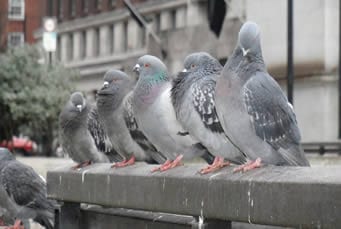
by Pigeon Patrol | Nov 12, 2021 | Bird Spikes, Columbidae, Doves, history of pigeons, MBCA, pet bird
Pigeons in the city eat almost anything but is this good for them? Is human food close enough to what they eat in the wild? What do pigeons eat in the wild?
Pigeons in the wild eat seeds, grains, berries, fruits, and vegetables. these animals are herbivores but if they need to they will eat insects, snails, worms, and small lizards. These foods offer pigeons more concentrated amounts of protein and fat. In the city, pigeons eat bread, french fries and pet food to name a few
It’s true that pigeons are very present in cities around the world today, but these birds do not only live in human settlements. In fact, there was a time when not a single pigeon dwelt in our cities or rural areas.
Pigeons originally came from the wild. This includes coastal areas, cliffs, rock edges, chaparral, rain forests, mangrove forests and arboreal forests
It would seem as though all the pigeons in the world left their natural habitat and moved to the city, but that’s not the case – there are still pigeons in the wild. The question now asked by many is: if pigeons live in the wild, what do they eat there?
What do pigeons eat in the wild?
Pigeons in the wild live off of what nature provides. These birds live in areas where food-producing trees and plants are abundant, and so these birds eat seeds, grains, berries, fruits, and vegetables.
A wild pigeon will also eat insects, snails, worms, and small lizards occasionally. Pigeons are herbivores and shouldn’t be meat-eaters, but since these birds live in the wild, they will eat almost anything they can find if they are hungry enough – especially if it appears edible and defenceless.
Pigeons eating meat can also be a good thing. Pigeons need lots of protein and fat in their diet to stay healthy and strong, they get more concentrated amounts of fat and protein in meat
Unfortunately, living in the wild comes with its disadvantages. These birds live in an environment filled with lots of predators. In addition, a scarcity of food in the wild may lead to starvation for the birds.
What do pigeons eat in urban areas?
Pigeons living around human habitations aren’t as privileged as pigeons in the wild, so they settle for whatever they can find. These birds have been around humans for many decades so they have learned to eat human food.
City pigeons eat grains, corn, wheat, pearl millet, seeds, bread, cookies, french fries, dried peas, cheese, rice, pasta, fried chicken, meat, fish, fruits, dog and cat food to name a few
Sometimes, people feed these birds by offering them something to eat. But this doesn’t happen all the time. In every city, there are people who terribly dislike birds and would never offer them food.
When city pigeons can’t find anything to eat, they resort to scavenging. If you live in a big city, you must have seen pigeons eating from the trash. This is bad for the birds as they can get sick from eating contaminated materials.
What do baby pigeons eat?
In the animal kingdom, mothers are usually the only parent responsible for nursing the young, but this is not so for pigeons.
When a baby pigeon is born, it’s the duty of both parents to feed and care for the young bird. And father pigeons never run from this responsibility.
Baby pigeons are fed crop milk by both parents until they are matured enough to eat solid food.
The crop milk fed to baby pigeons is extremely high in protein, fat, carbohydrate, antioxidants, vitamins, and minerals.
Should you feed pigeons in the wild?
There’s a yes and no to that.
Pigeons in the wild may need our help sometimes. And if we fail to offer them food during periods of food scarcity, they may end up starving to death or ingesting something that harms them.
Feeding pigeons is not something you’re obligated to do, but if you love wildlife, you can offer them healthy food whenever you get the chance.
It’s also important not to overdo this as they could become overly dependent on humans for food. Pigeons living in the wild need to know how to hunt for food themselves, not wait for humans to bring them food.
What should I feed my pet pigeon?
If you own a pet pigeon, you can feed it the following foods:
- Grains
- Seeds
- Vegetables
- Fruits
- Cooked eggs
- Cheese
- Lactose-free yogurt
- Cooked or uncooked rice and pasta (unsalted)
A pigeon’s diet must be diverse. Don’t solely feed your pet pigeon a certain type of food because it loves it. The bird should be fed a balanced diet if it is to stay healthy.
Pigeon feed is the most recommended food to give the birds as they contain balanced amounts of fats, proteins, carbohydrates, vitamins, and minerals.
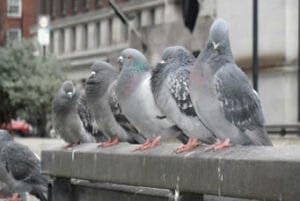
What not to feed pigeons
Pigeons eat a lot of things but should not be fed everything. Some foods will harm and can kill the birds. Below are foods you should never feed pigeons:
Sugary foods and sugary drinks: Sugary food can cause diabetes in the birds.
Avocado: Avocados contain persin which is toxic to the birds.
Apple: The seeds of apples are bad for the birds as they contain cyanide. The skin could also be coated with pesticides that may harm the birds.
Onion or garlic: Onions and garlic both contain chemicals that can irritate the bird’s mouth, oesophagus, crop and also cause them anaemia.
Chocolates: The theobromine in chocolate is highly toxic to the birds.
Salted foods: Pigeons should not ingest salted foods as the sodium can kill the birds.
Conclusion
Pigeons do not only live in cities; they can also be found in the wild. In the wild, the diet of these birds mainly consists of seeds, grains, fruits, vegetables, insects, and any small animal they can find.
It’s not a bad idea to feed wild pigeons wherever you find them, just don’t do it in excess. And if you’re to feed pigeons, make sure you aren’t giving them food that is harmful to them.
Source
Pigeon Patrol Products & Services is the leading manufacturer and distributor of bird deterrent (control) products in Canada. Pigeon Patrol products have solved pest bird problems in industrial, commercial, and residential settings since 2000, by using safe and humane bird deterrents with only bird and animal friendly solutions. At Pigeon Patrol, we manufacture and offer a variety of bird deterrents, ranging from Ultra-flex Bird Spikes with UV protection, Bird Netting, 4-S Bird Gel and the best Ultrasonic and audible sound devices on the market today.
Voted Best Canadian wholesaler for Bird Deterrent products ten years in a row.
Contact us at 1- 877– 4– NO-BIRD, (604) 585-9279 or visit our website at www.pigeonpatrol.ca
Pigeon/Pigeon Patrol / Pigeons Roosting / Vancouver Pigeon Control /Bird Spikes / Bird Control / Bird Deterrent / Pigeon Deterrent? Surrey Pigeon Control / Pest /Seagull deterrent / Vancouver Pigeon Blog / Birds Inside Home / Pigeons in the cities / Ice Pigeons/ What to do about pigeons/ sparrows , Damage by Sparrows, How To Keep Raccoons Away, Why Are Raccoons Considered Pests/ De-fence / Pigeon Nesting/ Bird Droppings / Pigeon Dropping/ woodpecker control/ Professional Bird Control Company/ Keep The Birds Away/ Birds/rats/ seagull/pigeon/woodpecker/ dove/sparrow/pidgeon control/pidgeon problem/ pidgeon control/flying rats/ pigeon Problems/ bird netting/bird gel/bird spray/bird nails/ bird guard
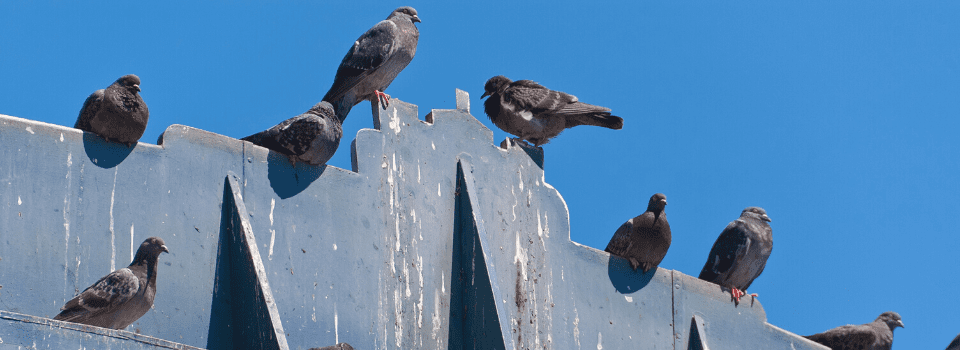
by Pigeon Patrol | Nov 1, 2021 | history of pigeons, MBCA, pet bird, Pigeon Control, Pigeon Droppings, Pigeon Patrol's Services, Pigeon Predators
An infection linked to pigeon droppings was a “contributing factor” in the death of a child at a Glasgow hospital, it has been confirmed.
The child was being treated at the Queen Elizabeth University Hospital when he or she appears to have caught the infection – a fungus called cryptococcus.
The child has not been named. The fungus did not contribute to the death in December of a second patient infected with the same pathogen, say experts.
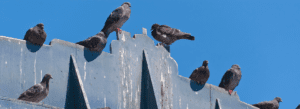
What is it?
Cryptococcus is a yeast-like fungus that lives in the environment.
It can be found in soil contaminated by pigeon droppings.
How can you catch it?
People can become infected if they breathe it in.
The child who died in December at the hospital in Glasgow had been exposed to the fungus.
Experts say the probable source has been traced to a room on the rooftop of the hospital. Pigeon droppings appeared in the room via a small break in the wall which was “invisible to the naked eye”, Scottish Health Secretary Jeane Freeman confirmed.
The hospital says it has put infection control measures in place and no further cases have been reported.
How risky is it?
Most won’t get sick, but vulnerable people with already weakened immunity can get very ill with a chest infection or meningitis.
Expert Prof Hugh Pennington says it is very unusual to see cases in the UK.
“It is common in other parts of the world, particularly tropical parts, in the US and countries like that where they have more problems with this particular kind of fungus. But in the UK, very uncommon.
“There are cases in people who have problems with their immune systems. They’re the people who are at risk with this kind of bug.”
Cryptococcus infection cannot spread from person to person.
How dangerous is pigeon poo?
Breathing dust or water droplets containing contaminated bird droppings can lead to several diseases, including a flu-like illness called psittacosis.
Salmonella – a bacterial infection that can cause diarrhoea – may also be present in some bird droppings.
If you are cleaning up or come into contact with droppings, you should take precautions. Wash your hands and clean any exposed skin before eating, drinking or putting your hands near your mouth.
Likewise, if you are feeding or handling birds, wash your hands afterwards.
If you have a compromised immune system, including from HIV/AIDS or cancer, you should not clean up droppings.
Source
Pigeon Patrol Products & Services is the leading manufacturer and distributor of bird deterrent (control) products in Canada. Pigeon Patrol products have solved pest bird problems in industrial, commercial, and residential settings since 2000, by using safe and humane bird deterrents with only bird and animal friendly solutions. At Pigeon Patrol, we manufacture and offer a variety of bird deterrents, ranging from Ultra-flex Bird Spikes with UV protection, Bird Netting, 4-S Bird Gel and the best Ultrasonic and audible sound devices on the market today.
Voted Best Canadian wholesaler for Bird Deterrent products ten years in a row.
Contact us at 1- 877– 4– NO-BIRD, (604) 585-9279 or visit our website at www.pigeonpatrol.ca
Pigeon/Pigeon Patrol / Pigeons Roosting / Vancouver Pigeon Control /Bird Spikes / Bird Control / Bird Deterrent / Pigeon Deterrent? Surrey Pigeon Control / Pest /Seagull deterrent / Vancouver Pigeon Blog / Birds Inside Home / Pigeons in the cities / Ice Pigeons/ What to do about pigeons/ sparrows , Damage by Sparrows, How To Keep Raccoons Away, Why Are Raccoons Considered Pests/ De-fence / Pigeon Nesting/ Bird Droppings / Pigeon Dropping/ woodpecker control/ Professional Bird Control Company/ Keep The Birds Away/ Birds/rats/ seagull/pigeon/woodpecker/ dove/sparrow/pidgeon control/pidgeon problem/ pidgeon control/flying rats/ pigeon Problems/ bird netting/bird gel/bird spray/bird nails/ bird guard
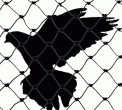
by Pigeon Patrol | Nov 1, 2021 | Bird Netting, Bird Spikes, Columbidae, Doves, history of pigeons, MBCA
ST. PAUL, Minn.–Pounded and strained by heavy traffic and weakened by missing bolts and cracking steel, the failed interstate bridge over the Mississippi River also faced a less obvious enemy: Birds, specifically pigeons.
Inspectors began documenting the build-up of pigeon dung on the span near downtown Minneapolis two decades ago.
Experts say the corrosive guano deposited all over the bridge’s framework helped the steel beams rust faster.

Although investigators have yet to identify the cause of the bridge’s Aug. 1 collapse, which killed at least 13 people and injured about 100, the pigeon problem is one of many factors that dogged the structure.
“There is a coating of pigeon dung on steel with nest and heavy build-up on the inside hollow box sections,” inspectors wrote in a 1987-1989 report.
In 1996, screens were installed over openings in the bridge’s beams to keep pigeons from nesting there, but that didn’t prevent the build-up of droppings elsewhere.
Pigeon droppings contain ammonia and acids, said chemist Neal Langerman, of the American Chemical Society. If the dung isn’t washed away, it dries out and turns into a concentrated salt. When water gets in and combines with the salt and ammonia, it creates small electrochemical reactions that rust the steel underneath.
“Every time you get a little bit of moisture there, you wind up having a little bit of electrochemistry occurring and you wind up with corrosion,” said Langerman. “Over a long term, it might in fact cause structural weaknesses.”
Langerman emphasized that he wasn’t saying absolutely that pigeon dung factored into the collapse of the bridge, but the problem is familiar to bridge inspectors everywhere.
The Colorado Department of Transportation spent so much time cleaning pigeon manure off bridges that it’s researching new ways to keep the birds away from its spans.
Source
Pigeon Patrol Products & Services is the leading manufacturer and distributor of bird deterrent (control) products in Canada. Pigeon Patrol products have solved pest bird problems in industrial, commercial, and residential settings since 2000, by using safe and humane bird deterrents with only bird and animal friendly solutions. At Pigeon Patrol, we manufacture and offer a variety of bird deterrents, ranging from Ultra-flex Bird Spikes with UV protection, Bird Netting, 4-S Bird Gel and the best Ultrasonic and audible sound devices on the market today.
Voted Best Canadian wholesaler for Bird Deterrent products ten years in a row.
Contact us at 1- 877– 4– NO-BIRD, (604) 585-9279 or visit our website at www.pigeonpatrol.ca
Pigeon/Pigeon Patrol / Pigeons Roosting / Vancouver Pigeon Control /Bird Spikes / Bird Control / Bird Deterrent / Pigeon Deterrent? Surrey Pigeon Control / Pest /Seagull deterrent / Vancouver Pigeon Blog / Birds Inside Home / Pigeons in the cities / Ice Pigeons/ What to do about pigeons/ sparrows , Damage by Sparrows, How To Keep Raccoons Away, Why Are Raccoons Considered Pests/ De-fence / Pigeon Nesting/ Bird Droppings / Pigeon Dropping/ woodpecker control/ Professional Bird Control Company/ Keep The Birds Away/ Birds/rats/ seagull/pigeon/woodpecker/ dove/sparrow/pidgeon control/pidgeon problem/ pidgeon control/flying rats/ pigeon Problems/ bird netting/bird gel/bird spray/bird nails/ bird guard
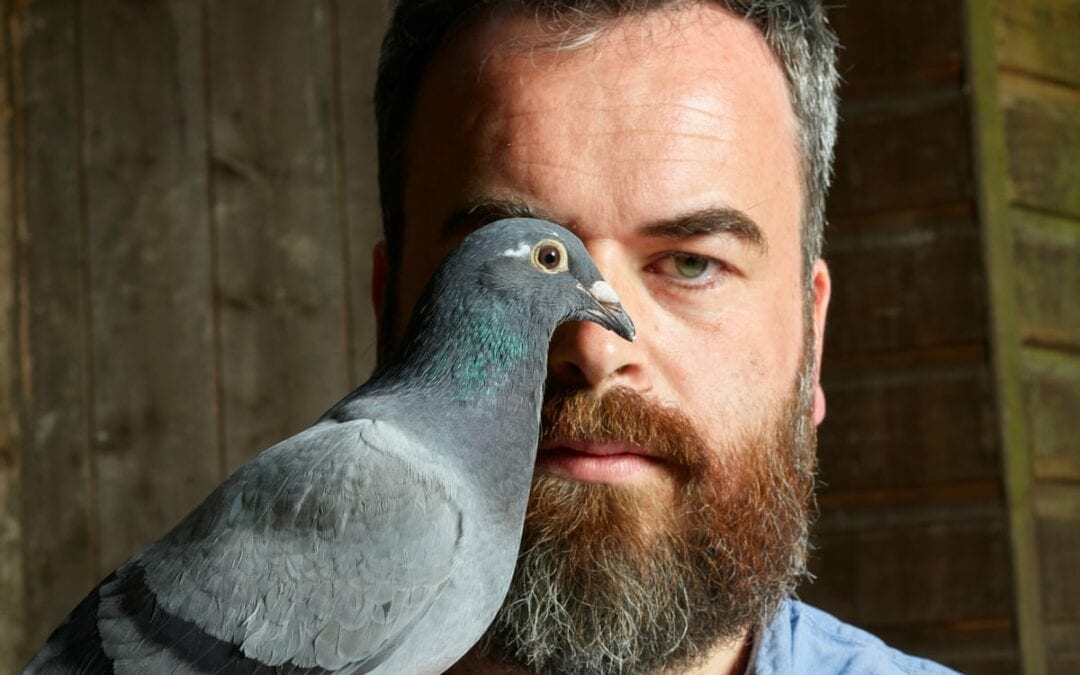
by Pigeon Patrol | Oct 20, 2021 | Columbidae, Doves, history of pigeons, MBCA, pet bird, Pigeon Control
Some people pay to keep pigeons away from their property. Others, especially in China, love the ubiquitous rock pigeon. (Yep, that’s the same species that perches on statues around the world, gobbles up stale hot dog buns off the street and uses parked cars as latrines.) And as the saying goes, one person’s trash is another’s treasure: Last weekend, one bird enthusiast dropped $1.4 million on a Belgian pigeon named Armando.
Granted, Armando is no ordinary pigeon. Joshua Berlinger at CNN reports that he’s a world-record holding racing pigeon, considered the “best long distance pigeon” of all time according to pigeon racing information hub and organization Pipa, which is short for Pigeon Paradise. Armando was one of 178 pigeons sold at auction by Belgian breeder Joel Verschoot, bringing in a total of $2.5 million. Besides the champ, another pigeon named Contador was sold for $225,000 and seven of Armando’s children were sold for an average of $24,000.
Prior to the sale, the previously most expensive pigeon was Nadine, a bird that sold for $450,000 to a Chinese buyer in 2017. For comparison, the average price for a good racing pigeon is in the $2,800 range.
Nikolaas Gyselbrecht, the CEO of Pipa says the high-dollar auction was incredible. “It was unreal, the feeling—it was something out of this world,” he tells the BBC. “In our wildest dreams, we had never hoped for a price like that. We hoped for around €400,000 to €500,000 [$450,000 to $550,000], and we only dreamed of €600,000 [$675,000].”
When Armando, now five years old, travels to China, he won’t be setting any new records. The badass bird is now retired from racing and will be put out to stud. Gyselbrecht says pigeons can sire children until around age 10 and can live until 20. So Armando won’t be bringing in much prize money. But if he inseminates enough eggs, he might be able to alleviate his purchase price.
So, why are Chinese buyers dropping so much money on pigeons? Berlinger reports that pigeon racing is the sport du jour for the upper and middle class in parts of China. Currently, there are about 90,000 pigeon breeders in Beijing alone registered with the Racing Pigeons Association. Prizes for races often reach into the tens of thousands of dollars.
Jiangming Liu, a Pipa employee in China, says the fact that pigeon racing is the only sport that people can legally gamble on in mainland China has increased its popularity. And since anyone can participate, young, old, healthy or not, it appeals to a wide swathe of people.
“Everyone can do it. From regular people to some rich people. Regular people buy cheap pigeons. Rich people buy expensive pigeons,” Liu tells CNN’s Berlinger.
So, how does pigeon racing work? Pigeons have a strong homing sense and have been used for millennia as carrier pigeons to send messages between predetermined points. Using that instinct, in the 1800s pigeon breeders began setting up races, taking the birds miles from their roosts and releasing them, timing them to see which returned home quickest. Over the decades the sport has become more much more sophisticated and pigeons, like Armando, have been bred for speed and homing ability.
Source
Pigeon Patrol Products & Services is the leading manufacturer and distributor of bird deterrent (control) products in Canada. Pigeon Patrol products have solved pest bird problems in industrial, commercial, and residential settings since 2000, by using safe and humane bird deterrents with only bird and animal friendly solutions. At Pigeon Patrol, we manufacture and offer a variety of bird deterrents, ranging from Ultra-flex Bird Spikes with UV protection, Bird Netting, 4-S Bird Gel and the best Ultrasonic and audible sound devices on the market today.
Voted Best Canadian wholesaler for Bird Deterrent products ten years in a row.
Contact us at 1- 877– 4– NO-BIRD, (604) 585-9279 or visit our website at www.pigeonpatrol.ca
Pigeon/Pigeon Patrol / Pigeons Roosting / Vancouver Pigeon Control /Bird Spikes / Bird Control / Bird Deterrent / Pigeon Deterrent? Surrey Pigeon Control / Pest /Seagull deterrent / Vancouver Pigeon Blog / Birds Inside Home / Pigeons in the cities / Ice Pigeons/ What to do about pigeons/ sparrows , Damage by Sparrows, How To Keep Raccoons Away, Why Are Raccoons Considered Pests/ De-fence / Pigeon Nesting/ Bird Droppings / Pigeon Dropping/ woodpecker control/ Professional Bird Control Company/ Keep The Birds Away/ Birds/rats/ seagull/pigeon/woodpecker/ dove/sparrow/pidgeon control/pidgeon problem/ pidgeon control/flying rats/ pigeon Problems/ bird netting/bird gel/bird spray/bird nails/ bird guard










